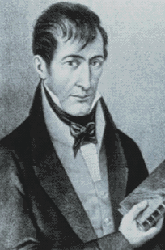José Joaquín Fernández de Lizardi
(1776-1827)
José Joaquín
Fernández de Lizardi was born in the famous year of 1776 in Mexico City. He is often considered the
author of the first Latin America novel as
this literary genre has been known since the 19th century. (What
actually constitutes a novel has long been the subject of much discussion, and
there are many other candidates for the title of first Latin American novelist.)
His intellectual world view was formed by the rationalism and anticlericalism
of the French encyclopedists and philosophes.
He spent his
childhood in Tepotzotlán. His father was a medical doctor in this small town
that lies about 30 miles northeast of the capital. Then he studied a philosophy
curriculum in Mexico City.
In 1811, he began publishing short satirical pieces the newspaper Diario de
México. The dangerous tone and ideas in these journalistic articles caused
Viceroy Venegas to have him jailed. The following year he began publishing his
famous series of articles titled "El pensador mexicano" (The Mexican
Thinker), and he began using this phrase as his pseudonym. In 1816, during the
Mexican War of Independence he began writing novels and plays as a way to avoid
the official government's political censorship. In this year his most famous
publication, a picaresque novel, appeared: El
Periquillo Sarniento. When constitutional protections were restored in 1820
he returned to journalism, but his publications caused him to land in jail
again in 1821, and, in 1823, the Church had him excommunicated. He died of
tuberculosis in Mexico City
in 1827.
Fernández de
Lizardi was a poet (until 1812), journalist, satirist, and pamphleteer. In
fact, he traveled throughout Mexico
during the War of Independence with his own portable printing press, which he
used to print many of his pamphlets. He possessed strong liberal sympathies,
but he was not an ardent revolutionary. He did not think that Spain was the core perpetrator of evil in Mexico; rather,
he opposed those institutions that stood against reason and liberty. In short,
he was vehemently opposed to what he saw as the Inquisition and the Church's
obscurantism. He favored radical social reform, and he attacked the corrupt customs
he saw everywhere in Mexican society.
El Periquillo Sarniento (1816) was written in part to express opposition to the
reestablishment of the Inquisition in Spain (Mexico was still officially
a Spanish colony in 1816). It is a work of almost sordid realism, and, as such,
it is one of the last typically picaresque novels in Spanish. One finds
constant descriptive vignettes of typical customs of the time and place. In
this sense, El Periquillo Sarniento is a precursor of the later development of
the Spanish pre-realist prose genre of costumbrismo.
The protagonist, Periquillo (Pedro Sarmiento), narrates his adventures in the
first person: he undergoes a series of adventures, and he changes masters and
jobs frequently. He has a weak character who is the victim of bad influences
and who has an independent will he seldom exercises, yet the narrator does not
deny that paths to achieve good works do exist. The work is salted with a
number of moralizing sermonettes, which are part of the author's campaign to
change society, not just to describe it. He expresses a preference to fuse
Christianity with liberalism, which supports the view that Fernández de Lizardi
is more moralizer than artist. Sermons are mixed with absurd snippets of moral
advice, grotesque situations, a plethora of diverse characters, and caricatures
of colonial institutions and the people who represent them.
Among other
prominent works of Lizardi's are "La Quijotita y su prima"
(1819) and "Don Catrín de la Fachenda" (1825).
Click here to see
a short excerpt from his novel: => El Periquillo Sarniento.



